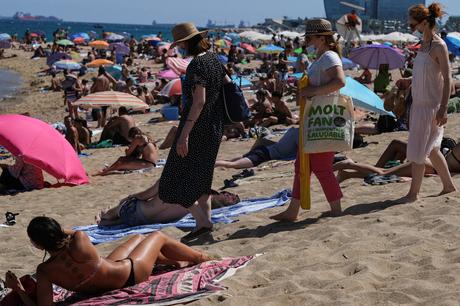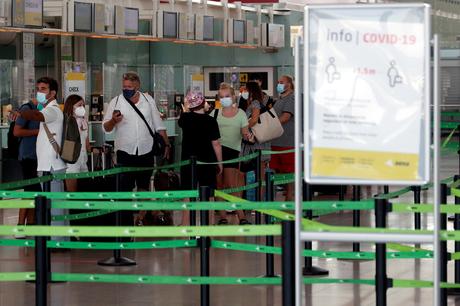
(Madrid) Spain proclaimed loud and clear on Sunday that it was a safe tourist destination despite the outbreak of coronavirus cases, after the UK's decision to reinstate a quarantine that has sparked controversy among holidaymakers.
Published on 26 July 2020 to 13 h 57
Diego URDANETA
France Media Agency
“Spain is a safe country. Like other European countries, Spain has new outbreaks. It’s not unusual. Most importantly, Spain is making great efforts to control these outbreaks, ”Foreign Minister Arancha Gonzalez Laya told reporters.
A little earlier, his ministry had assured that the situation was “under control” and the “localized, isolated and controlled outbreaks”.
Second world tourist destination behind France, Spain hoped to be able to attract enough British or German tourists, in particular to save what could be its summer season.
But the cases of coronavirus have tripled in two weeks in the country, in particular in the tourist region of Catalonia (north-east) and in the neighboring region of Aragon. Of the more than 272 homes monitored by the authorities, the most important are in Barcelona and Lleida, in Catalonia, and Zaragoza (Aragon).
As a result, the British government has imposed since Sunday on passengers arriving from Spain a fortnight in isolation while Norway has imposed a quarantine of ten days and that France has “strongly recommended” to its nationals to '' Avoid 'going to Catalonia.
No apologies from London
This British quarantine aroused controversy among holidaymakers. “We're shocked, we didn't see it coming, otherwise we wouldn't have left,” Jill Witte, who arrived from Barcelona on Sunday at Gatwick Airport near London, told UK news agency PA Jill Witte.
Neal Evans, British 49, spent Sunday on the beach in Torremolinos in Andalusia (south). “This is not fair, neither for the British nor for the Spaniards, who have to think about their jobs,” he told AFP.
Entered into force at midnight, just a few hours after its announcement, this measure caught many travelers, including Transport Minister Grant Shapps, on vacation in Spain.

PHOTO ALBERT GEA, REUTERS
The British government has imposed since Sunday on passengers arriving from Spain a fortnight in isolation while Norway has imposed a quarantine of ten days and that France has “strongly recommended” to its nationals to ” avoid ”going to Catalonia.
Why “we have not been warned more in advance” by the government, asked the British tour operator Tui, which estimates at several thousand the number of Britons who went to Spain for the weekend .
“We must be able to take rapid and decisive decisions”, “otherwise, we risk a new contamination in the United Kingdom, a potential second wave and a new confinement”, justified on Sky News the British Minister for Foreign Affairs Dominic Raab.
“We are not going to apologize”, he said.
In order to try to limit the impact on the tourism sector, which weighs 11% of GDP in Spain, his Spanish counterpart Arancha Gonzalez Laya has indicated that he is discussing with London the possibility that the British going to the Balearics or the Canaries could be exempted from quarantine.
Very popular with the British, these archipelagos have a level of contagion “much lower than the epidemiological data of the United Kingdom”, she underlined.
Faced with the rebound in contagions, the Spanish regions, responsible for health, have tightened the screw.
Catalonia has thus invited the inhabitants of the Barcelona metropolis to stay at home and also decided on Friday to close discos and night bars, considered hotbeds of contagion.
Most regions of the country have also decided to strengthen the compulsory nature of the mask, which must be worn at all times in the street under penalty of a fine. Local restrictions have also been taken, such as limiting the number of people who can meet or banning visits to nursing homes.
The central government, which ensures that this is not a “second wave”, considers that the regions have sufficient tools to control the epidemic and rule out the possibility of a new state of 'alert. This exceptional regime made it possible to impose an extremely strict confinement in mid-March which was not completely lifted until 16 June.
Spain, one of the countries most affected by the pandemic, officially counts more than 26 280 dead and 272 400 contaminations.
In this context, a mass in memory of the victims of the pandemic will be held at the end of the day in the Basilica of the Sagrada Familia in Barcelona where participants will have their temperature taken at the entrance.

